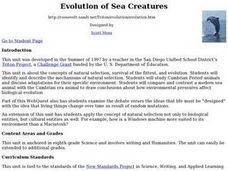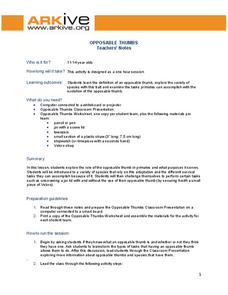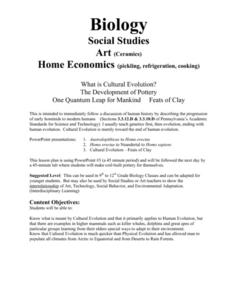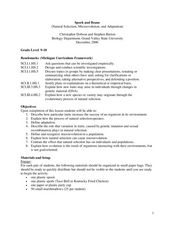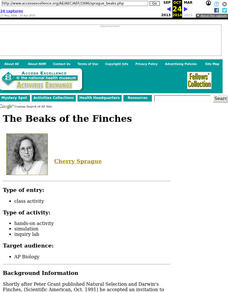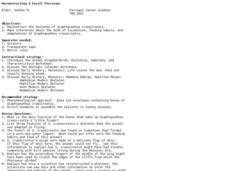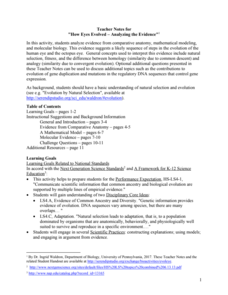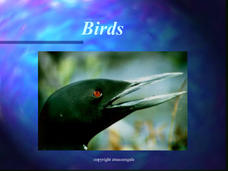Curated OER
Evolution of Sea Creatures
Young scholars identify and describe the mechanisms of natural selection. They study Cambrian Period animals and discuss adaptations for their specific environment.Students compare and contrast a modern sea animal with the Cambrian era...
Curated OER
Lifestyles of the Extreme and Adapted
Students explain challenging theories about the evolution and distribution of microbes. They also investigate other examples of extremophile species, then create posters and write diary entries about them.
ARKive
Opposable Thumbs
How do opposable thumbs help you complete certain tasks? An activity about evolutionary traits prompts learners to try writing their name, twist the lid off of a jar, and use tweezers to pick up a straw, first with their normal grip, and...
Curated OER
Structures That Reveal Common Ancestry
Float like a butterfly, sting like a bee, check out wing shapes for common ancestry! Beginning biologists compare wings as analogous structures and discover that environment influences evolution of adaptations. A third activity relies on...
University of Georgia
Endothermic and Exothermic Reactions
Equip your chemistry class with the tools to properly understand endothermic and exothermic reactions. Young chemists collect, analyze, and graph data to determine how the Law of Conservation of Matter is applied to chemical composition...
Curated OER
What is Cultural Evolution?
Young scholars comprehend what is meant by Cultural Evolution and that it primarily applies at Human Evolution, but that there are examples in higher mammals such as a killer whales, dolphins and great apes of particular groups by...
Curated OER
Mechanisms of Evolution
In this evolution worksheet, students will answer questions about population genetics and the theory of evolution of species. This worksheet has 15 true or false, 6 fill in the blank, and 4 short answer questions.
Curated OER
Animal Adaptations
Tenth graders participate in an arthropod scavenger hunt. In groups of two, they identify and collect two specimens of arthropods in the school area, and create a table of all the specimens and what class they belong to.
Curated OER
So You Think the World Evolves Around You?
Students examine the topic of evolution as it relates to biodiversity in various remote areas of the world. They watch videos, conduct Internet research, and in small groups create a digital video report to illustrate common evolution in...
Curated OER
The Great Jellybean Hunt
Students model natural selection by acting as predators of jellybeans. In this evolution lesson plan, students use plastic utensils to pick up jellybeans. They use different colors of backgrounds to demonstrate the effects of camouflage...
Curated OER
Diversity/Natural Selection
High schoolers examine mechanisms behind biological evolution and the theories that feed it, and are able to demonstrate their knowledge of these theories in a story.
Curated OER
Spork and Beans
Students examine natural selection, how it works and how it can cause microevolution. In this evolution lesson students complete a lab activity that shows the effects that natural selection has on organisms.
Curated OER
The Birds and the Beaks
Young scholars explore the adaptations that birds have. In this adaptations lesson students view a video and create a concept map of birds and their adaptive traits.
Curated OER
Mammals: Mammals and Their Ways
Students study the difference between innate and learned behaviors. They observe the adaptations and behaviors of mammals in this series of lessons.
Curated OER
The Peppered Moth
In this evolution worksheet, students read about the changes the peppered moth went through over 100 year time period. Students complete 3 short answer questions based on what they read.
Curated OER
The Rise and Fall of the Mammoths
Students develop an understanding of the evolution of species in the context of the woolly mammoth. They examine the fossil record to explain natural selection.
Curated OER
Selection and Variation in the Egyptian Origami Bird
Students investigate genetics and evolution of species. They simulate the breeding of birds using origami birds. In addition, using dice they introduce genetic variation into the species.
Curated OER
The Beaks of the Finches
Students become birds and are given "beak-types". After completing the simulation, students relate results to adaptations and natural selection. Extensions of the simulation allow for comparative results and include population genetics.
Curated OER
Reconstructing a Fossil Pterosaur
Students reconstruct the skeleton of the fossil Scaphognathus crassirostis. In this fossil lesson plan, students discuss the Kingdoms of life, geologic history and the history of the skeletons of species. Students are given 20 minutes to...
Curated OER
Natural Selection and Evidence Worksheet
Matching and fill-in-the-blank exercises give biology whizzes a chance to practice vocabulary associated with evolution. Terms to be reviewed focus on evidence for evolution, natural selection concepts, and some genetics words. You could...
Curated OER
Evolution: Adaptation
Tenth graders practice new skills and apply them. The skills of research should motivate them to want more knowledge. The concept of adaptation is used as a context for the lesson of practicing research skills.
Howard Hughes Medical Institute
Developing an Explanation for Mouse Fur Color
Whether or not you think mice are nice, you'll love the colorful activity! Scholars examine evidence for evolution in the rock pocket mouse through video, discussion, and collaborative work. Learners watch a video regarding variation in...
Serendip
How Eyes Evolved – Analyzing the Evidence
Octopodes existed for hundreds of thousands of years before humans, yet our eyes share many similarities. Scholars analyze the evidence to determine if the evolution of eyes best fits a homology or analogy model. They discuss the issue...
Biology Junction
Birds
Birds adapted to almost every climate on the planet, from the Arctic to the rain forests. A presentation focused on birds covers their similarities and differences. It starts with their evolution from reptiles, their many physical...


